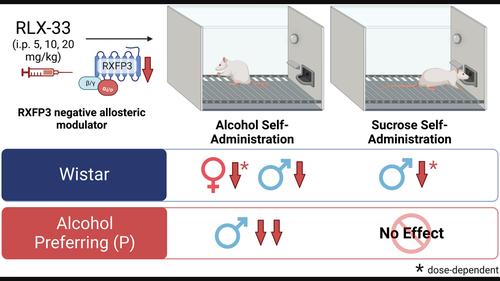当前位置:
X-MOL 学术
›
J. Neurochem.
›
论文详情
Our official English website, www.x-mol.net, welcomes your
feedback! (Note: you will need to create a separate account there.)
Novel RXFP3 negative allosteric modulator RLX-33 reduces alcohol self-administration in rats
Journal of Neurochemistry ( IF 4.2 ) Pub Date : 2023-09-06 , DOI: 10.1111/jnc.15949 Kalynn J Van Voorhies 1 , Wen Liu 1 , Dennis F Lovelock 1 , Sophia Lin 1 , Jiaqi Liu 1 , Dongliang Guan 2 , Elaine A Gay 2 , Chunyang Jin 2 , Joyce Besheer 1, 3
Journal of Neurochemistry ( IF 4.2 ) Pub Date : 2023-09-06 , DOI: 10.1111/jnc.15949 Kalynn J Van Voorhies 1 , Wen Liu 1 , Dennis F Lovelock 1 , Sophia Lin 1 , Jiaqi Liu 1 , Dongliang Guan 2 , Elaine A Gay 2 , Chunyang Jin 2 , Joyce Besheer 1, 3
Affiliation

|
There is much interest in identifying novel pharmacotherapeutic targets that improve clinical outcomes for the treatment of alcohol use disorder (AUD). One promising target for therapeutic intervention is the relaxin family peptide 3 (RXFP3) receptor, a cognate receptor for neuropeptide relaxin-3, which has previously been implicated in regulating alcohol drinking behavior. Recently, we developed the first small-molecule RXFP3-selective negative allosteric modulator (NAM) RLX-33. Therefore, the goal of the present work was to characterize the impact of this novel NAM on affective-related behaviors and alcohol self-administration in rats. First, the effects of RLX-33 were tested on alcohol and sucrose self-administration in Wistar and alcohol-preferring P rats to determine the dose–response profile and specificity for alcohol. Then, we assessed the effects of systemic RLX-33 injection in Wistar rats in a battery of behavioral assays (open-field test, elevated zero maze, acoustic startle response test, and prepulse inhibition) and tested for alcohol clearance. We found that the lowest effective dose (5 mg/kg) reduced alcohol self-administration in both male and female Wistar rats, while in alcohol-preferring P rats, this effect was restricted to males, and there were no effects on sucrose self-administration or general locomotor activity. The characterization of affective and metabolic effects in Wistar rats generally found few locomotor, affective, or alcohol clearance changes, particularly at the 5 mg/kg dose. Overall, these findings are promising and suggest that RXFP3 NAM has potential as a pharmacological target for treating AUD.
中文翻译:

新型 RXFP3 负变构调节剂 RLX-33 减少大鼠酒精自我给药
人们对于确定改善酒精使用障碍 (AUD) 治疗临床结局的新型药物治疗靶点非常感兴趣。治疗干预的一个有前途的靶点是松弛素家族肽 3 (RXFP3) 受体,它是神经肽松弛素-3 的同源受体,以前与调节饮酒行为有关。最近,我们开发了第一个小分子 RXFP3 选择性负变构调节剂 (NAM) RLX-33。因此,本研究的目标是表征这种新型 NAM 对大鼠情感相关行为和酒精自我给药的影响。首先,测试 RLX-33 对 Wistar 和嗜酒精的 P 大鼠的酒精和蔗糖自我给药的影响,以确定剂量反应特征和对酒精的特异性。然后,我们在一系列行为测定 (旷场试验、高架零迷宫、声学惊吓反应试验和前脉冲抑制) 中评估了全身性 RLX-33 注射对 Wistar 大鼠的影响,并测试了酒精清除率。我们发现最低有效剂量 (5 mg/kg) 减少了雄性和雌性 Wistar 大鼠的酒精自我给药,而在喜欢酒精的 P 大鼠中,这种影响仅限于雄性,对蔗糖自我给药或一般运动活动没有影响。Wistar 大鼠的情感和代谢效应的表征通常发现运动、情感或酒精清除率变化很小,尤其是在 5 mg/kg 剂量下。总体而言,这些发现是有希望的,并表明 RXFP3 NAM 具有作为治疗 AUD 的药理学靶点的潜力。
更新日期:2023-09-06
中文翻译:

新型 RXFP3 负变构调节剂 RLX-33 减少大鼠酒精自我给药
人们对于确定改善酒精使用障碍 (AUD) 治疗临床结局的新型药物治疗靶点非常感兴趣。治疗干预的一个有前途的靶点是松弛素家族肽 3 (RXFP3) 受体,它是神经肽松弛素-3 的同源受体,以前与调节饮酒行为有关。最近,我们开发了第一个小分子 RXFP3 选择性负变构调节剂 (NAM) RLX-33。因此,本研究的目标是表征这种新型 NAM 对大鼠情感相关行为和酒精自我给药的影响。首先,测试 RLX-33 对 Wistar 和嗜酒精的 P 大鼠的酒精和蔗糖自我给药的影响,以确定剂量反应特征和对酒精的特异性。然后,我们在一系列行为测定 (旷场试验、高架零迷宫、声学惊吓反应试验和前脉冲抑制) 中评估了全身性 RLX-33 注射对 Wistar 大鼠的影响,并测试了酒精清除率。我们发现最低有效剂量 (5 mg/kg) 减少了雄性和雌性 Wistar 大鼠的酒精自我给药,而在喜欢酒精的 P 大鼠中,这种影响仅限于雄性,对蔗糖自我给药或一般运动活动没有影响。Wistar 大鼠的情感和代谢效应的表征通常发现运动、情感或酒精清除率变化很小,尤其是在 5 mg/kg 剂量下。总体而言,这些发现是有希望的,并表明 RXFP3 NAM 具有作为治疗 AUD 的药理学靶点的潜力。






























 京公网安备 11010802027423号
京公网安备 11010802027423号